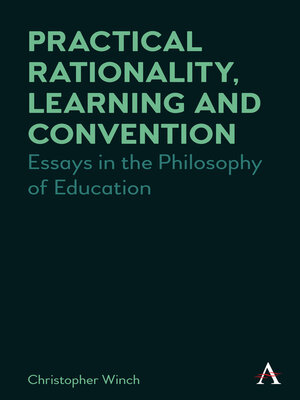Practical Rationality, Learning and Convention
ebook ∣ Essays in the Philosophy of Education · Anthem Studies in Wittgenstein
By Christopher Winch

Sign up to save your library
With an OverDrive account, you can save your favorite libraries for at-a-glance information about availability. Find out more about OverDrive accounts.
Find this title in Libby, the library reading app by OverDrive.



Search for a digital library with this title
Title found at these libraries:
| Library Name | Distance |
|---|---|
| Loading... |
This collection of articles by one of the leading philosophers of education in the English-speaking world takes up themes in the philosophy of language, epistemology and the philosophy of learning to shed light on philosophical puzzles concerning learning, concept formation, knowing how, the following of norms and whether there is a single concept of rationality that can be applied universally. Winch writes from a Wittgensteinian perspective, seeking dissolution rather than solution to philosophical problems. The collection also has a strong practical emphasis; the topics chosen are nearly all related to practical problems of educational policy and practice as well as have intrinsic philosophical interest.
|The proposed volume covers Christopher Winch's work over a period of 37 years and illustrates four interconnected themes that have informed his thinking over that period. Writing from a Wittgensteinian perspective, Winch is primarily interested in applying Wittgenstein's general approach to philosophising to educational problems and puzzles of a variety of different kinds. Throughout the collection there is an emphasis on the complexity and subtlety of many of the philosophical problems associated with education, the importance of appreciating differences and the contestability of many educational judgements. Thus the volume starts with a section on rationality and argument and a discussion of some of the perplexities about the nature of literacy and whether it represents a cognitive 'leap forward' for the human race or whether it is more of an enabling technology. It is followed, in a reply to David Cooper, by an article that emphasises the importance of charitable interpretation in understanding reasoning and looks at some of the difficulties involved in understanding reasoning in informal contexts.
Winch's interest in rule-following and concept formation is the theme of the next few articles. Winch has long been interested in philosophical aspects of professional action and judgement. The third section of this book focuses on that preoccupation. Gilbert Ryle's ideas as well as Wittgenstein's have been a significant influence on this. This section closes with a discussion of the sense we can make of the claim that theoretical knowledge can inform agency in professional contexts. The fourth section gathers together seven papers on learning and training that Winch has published over the last 25 years. The overarching theme of this section is the highly variegated nature of the phenomena of learning and the difficulty of constructing a 'grand theory' of learning.







